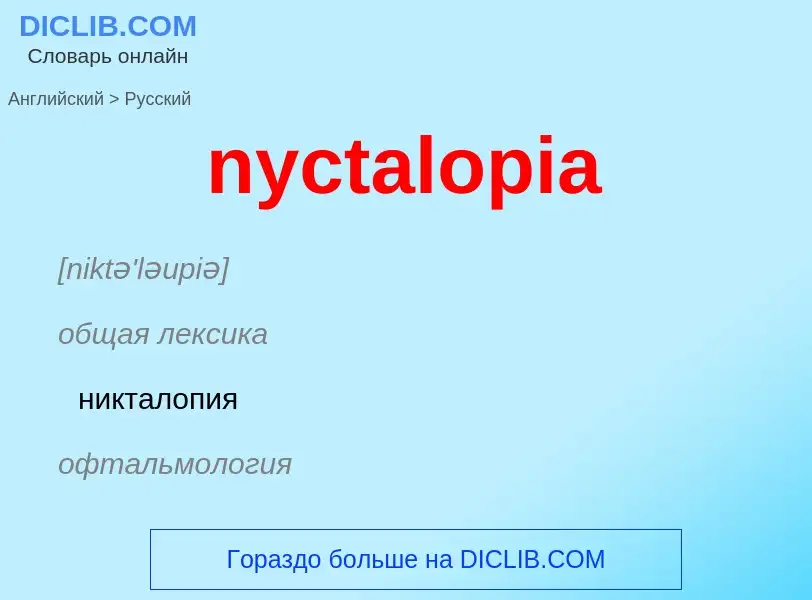Vertaling en analyse van woorden door kunstmatige intelligentie ChatGPT
Op deze pagina kunt u een gedetailleerde analyse krijgen van een woord of zin, geproduceerd met behulp van de beste kunstmatige intelligentietechnologie tot nu toe:
- hoe het woord wordt gebruikt
- gebruiksfrequentie
- het wordt vaker gebruikt in mondelinge of schriftelijke toespraken
- opties voor woordvertaling
- Gebruiksvoorbeelden (meerdere zinnen met vertaling)
- etymologie
nyctalopia - vertaling naar russisch
[niktə'ləupiə]
общая лексика
никталопия
офтальмология
никталопия (куриная слепота)
куриная слепота
существительное
общая лексика
(в неправ. употреблении) способность видеть только ночью
медицина
никталопия
синоним
Definitie
Wikipedia

Nyctalopia (; from Ancient Greek νύκτ- (núkt-) 'night', ἀλαός (alaós) 'blind, invisible', and ὄψ (óps) 'eye'), also called night-blindness, is a condition making it difficult or impossible to see in relatively low light. It is a symptom of several eye diseases. Night blindness may exist from birth, or be caused by injury or malnutrition (for example, vitamin A deficiency). It can be described as insufficient adaptation to darkness.
The most common cause of nyctalopia is retinitis pigmentosa, a disorder in which the rod cells in the retina gradually lose their ability to respond to the light. Patients with this genetic condition have progressive nyctalopia and eventually, their daytime vision may also be affected. In X-linked congenital stationary night blindness, from birth the rods either do not work at all, or work very little, but the condition does not get worse.
Another cause of night blindness is a deficiency of retinol, or vitamin A1, found in fish oils, liver and dairy products.
The opposite problem, the inability to see in bright light, is known as hemeralopia and is much rarer.
Since the outer area of the retina is made up of more rods than cones, loss of peripheral vision often results in night blindness. Individuals with night blindness not only see poorly at night but also require extra time for their eyes to adjust from brightly lit areas to dim ones. Contrast vision may also be greatly reduced.
Rods contain a receptor-protein called rhodopsin. When light falls on rhodopsin, it undergoes a series of conformational changes ultimately generating electrical signals which are carried to the brain via the optic nerve. In the absence of light, rhodopsin is regenerated. The body synthesizes rhodopsin from vitamin A, which is why a deficiency in vitamin A causes poor night vision.
Refractive "vision correction" surgery (especially PRK with the complication of "haze") may rarely cause a reduction in best night-time acuity due to the impairment of contrast sensitivity function (CSF) which is induced by intraocular light-scatter resulting from surgical intervention in the natural structural integrity of the cornea.


